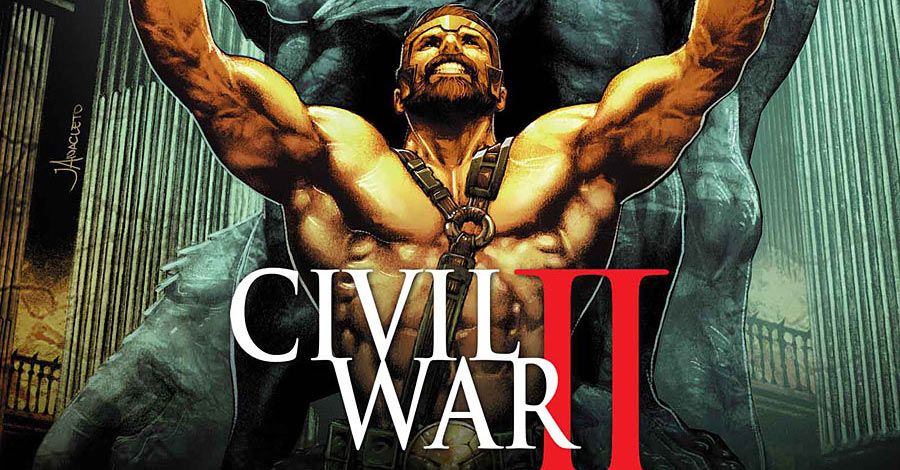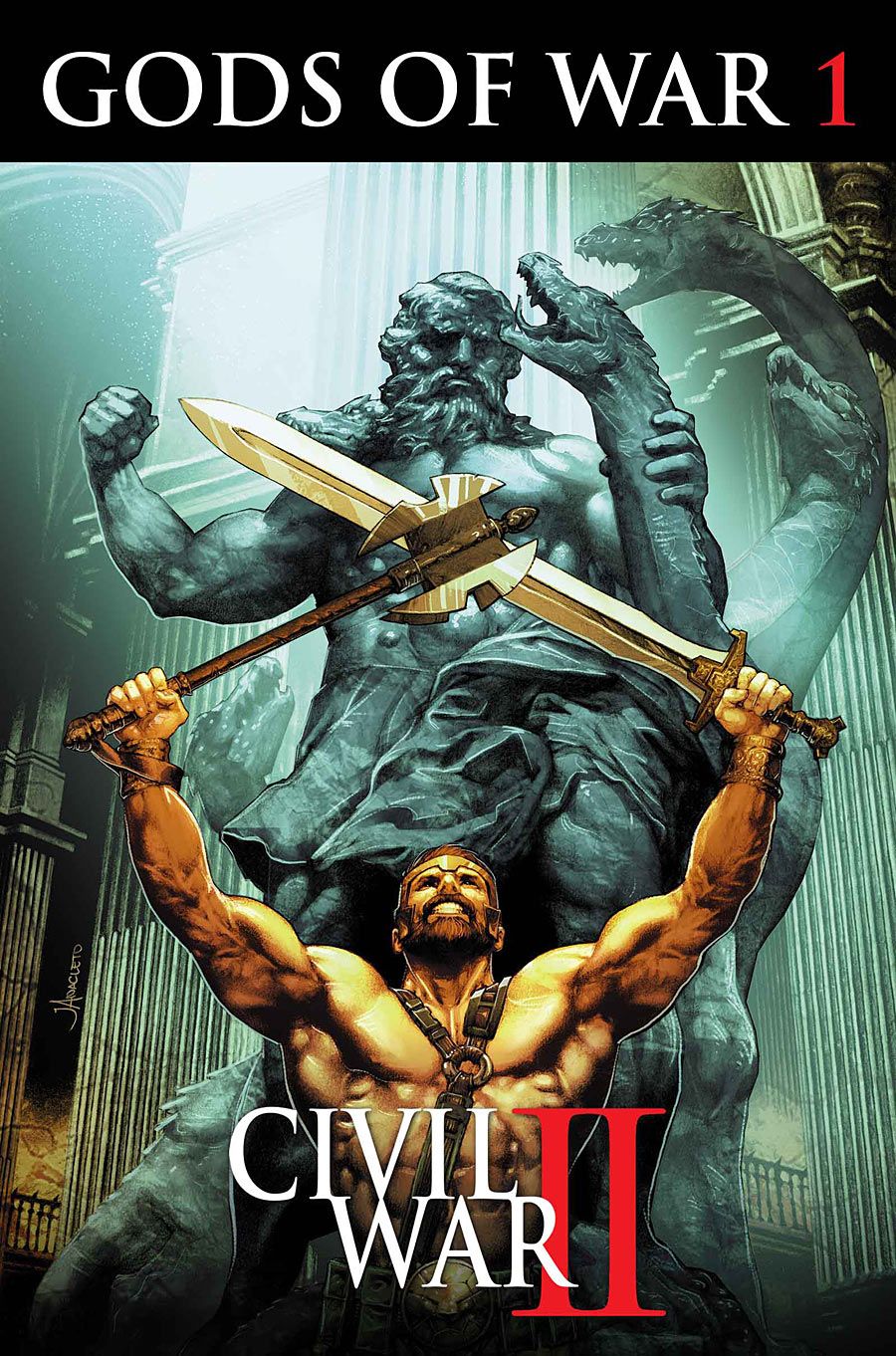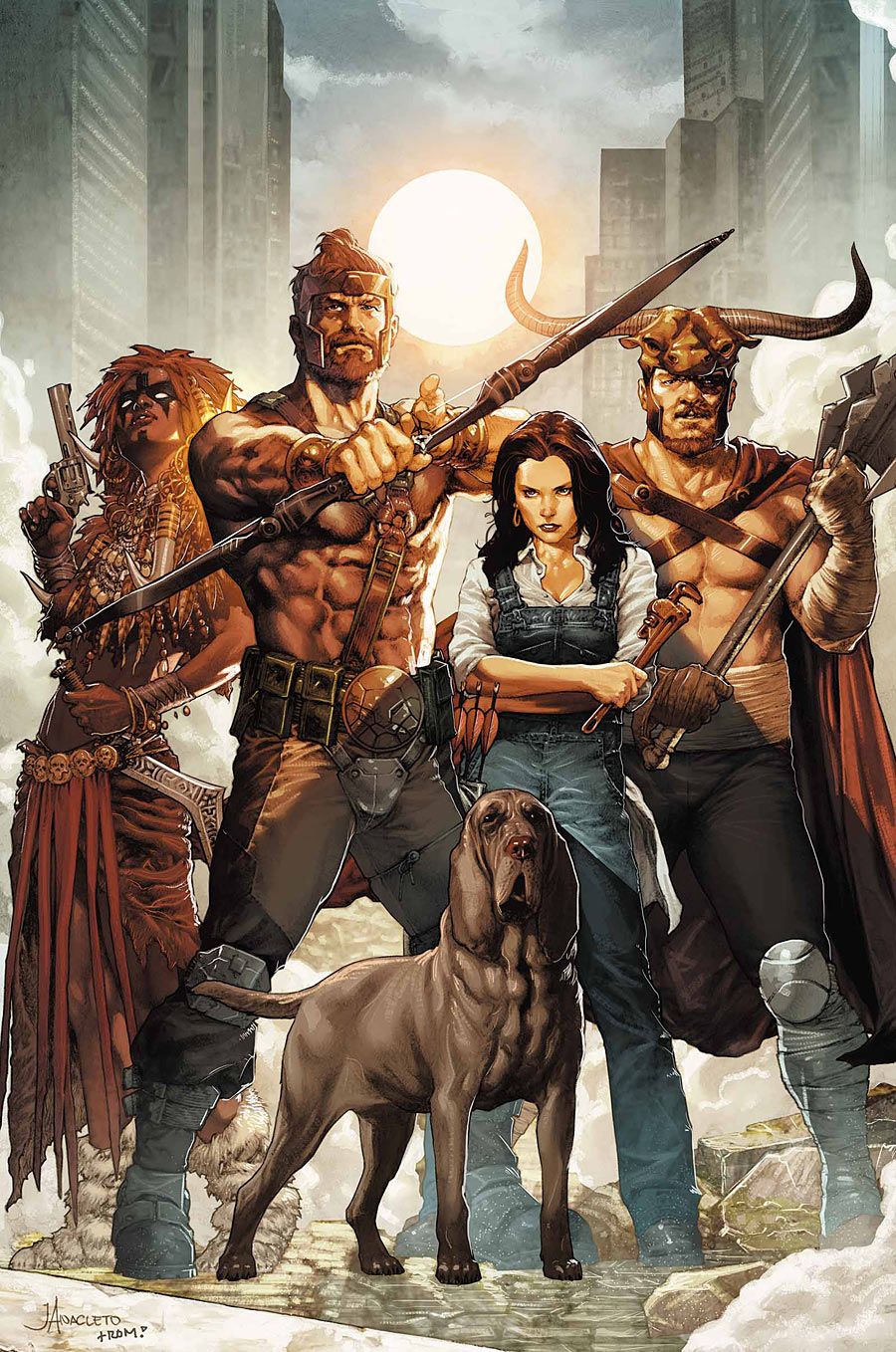The short term memory of mortals can be a blessing or a curse for the ageless gods and eternal heroes of the Marvel Universe, and former Avenger and immortal Olympian demigod Hercules is in the midst of finding that out for himself. Even as many of his heroic colleagues judge him based more on recent exploits of drunken buffoonery than his heroic deeds of lore, knowing how fickle memory can be has also inspired Herc to endeavor to become the consummate hero he once was -- and believes he can be again. Marvel's ongoing "Hercules" series by writer Dan Abnett and artist Luke Ross chronicles the character's struggle to revamp his modern reputation but his quest will hit a major crisis point this summer when heroes turn against hero as part of the upcoming "Civil War II" event.
RELATED: Abnett Forces Marvel's "Hercules" to Weather an Uprising Storm
Abnett and artist Emilio Laiso find Hercules locked out of the titular conflict and in desperate need of allies in "Civil War II: Gods of War." Like any ancient hero living in modern times, Hercules assembles a team of likeminded mythological figures and take down an impossible threat. Announced today at Marvel's "Civil War II" panel at the Chicago Comic and Entertainment Expo, CBR News has the exclusive first interview with Abnett the book. The veteran writer explained how the series takes Herc's quest to be a better hero to the next level, his protagonist's thoughts on the titular conflict, and the make-up of the Expendables-like team of ancient heroes he surrounds himself with.
CBR News: With six issues of the All-New, All-Different "Hercules" series under your belt by the time this series begins, has everything you've done been laying the groundwork for "Civil War II: Gods of War?"
Dan Abnett: It does, very much so. I personally find events and crossovers fantastic, but quite often an individual book will sort of have to stop what it's doing in order to jump on board and participate in those larger stories. So when Marvel talked to me about Hercules and how to transition him into "Civil War II" I suddenly saw an immense amount of connective tissue to what "Hercules" was already doing.
So rather than having him put a pin in what he's up to in the moment, going off and dealing with "Civil War II," and then coming back again, I went, "This is essentially all the same thing." There are some major areas of crossover. So I think the story is going to be very, very exciting and very entertaining. It will absolutely be accessible to new readers, but for those who have been reading "Hercules" it won't stop what's been going on there. I think that's a really important thing
It's sort of a joke, but in some respects when me and my editor Katie Kubert talked about this it's almost like it's an anti-crossover in as much as Hercules, as I've set him up in the series so far, is sort of on the outside. He's the world's first super hero, but he's ruined his reputation to such a degree that's he's seen as a drunkard and a joker. So his old friends on the Avengers treat him with a bit of caution. They don't include him in things the way they used to because they know it's going to end up in a lost weekend or whatever. That's a reputation he's trying to repair.
So there's all this stuff going on in "Civil War II" and no one is telling Hercules what it is. [Laughs] I think there's a real lovely sense that this is a character and a miniseries which is aware there's a crossover going on and wants to be part of it because they want to help, but the others are going, "Don't let Hercules in! He'll ruin everything." So there's a really good balance.
Hercules has his own struggles and battles, and he's becoming aware that there's this very big deal going down and it involves things that he isn't privy to. He wants to help. He wants to take a stand, and he certainly thinks that heroes should not fight heroes. That's absolutely not the way things should go.
His view on that is two-fold. He sees it as very much about fate. He believes a person's fate is determined, and for an ancient hero that means a great deal more. Because he's used to having his fate ordained and then damn well overcoming that. Plus, like I said, he's got problems of his own. The threats he's facing in "Hercules" will continue, and whereas normally he'd go and ask some of the Avengers for help he can't because they're all tied up in this enormous event that's happening.
So in some respect this is really him cut loose and trying to deal with what, on any other day, would be a world class threat. He's trying to find help to deal with that, but the normal avenues for help are not available. At the same time he's going to become involved in a war that's going to determine the way super heroes operate. His involvement very much comes out of his ongoing and very personal remit as a character, which I think is great. Because it's not four fun issues of Hercules and then back to your usual programming. This is continuing what has already been set up.
It sounds like it will pay off the current "Hercules" arc and push into the next level of his quest where we find out how Herc's heroic peers view him. It also seems like this would be a personal quest in that Herc fought side-by-side with Steve Rogers during the first "Civil War."
Absolutely, yes! He's seen this sort of thing happen before, and again, he doesn't like it. In his very long life he's seen plenty of occasions where heroes who should have been friends and allies turned on each other; not just super heroes, but mythologically speaking as well. Hercules thinks that heroes are there for a purpose and that they should be protecting people. They should be standing together, and they shouldn't have these kind of horrible schisms.
So he's quite motivated, but he also realizes that very few people want to listen to him because he's just Hercules. People think he's going to come up with some story about the old days that means nothing to anybody at all, or he's going to reach for the nearest flagon of wine and try and cheer everybody up. So the heroes are not trusting of the wisdom he's got which, let's face it, is considerable.
In these four issues he'll have his foot in his own affairs, and this big event that's going on. There's an enormous amount of fun to be had there and opportunities for the reader and for Hercules to get a measure of where he stands in the Marvel Universe now and what people think of him.
RELATED: Find Out Who's with Iron Man and Who's with Captain Marvel in New "Civil War II" Teasers
While it seems "Gods of War" will start with Hercules on the outside of the major conflict looking in, where do things go from there?
Hercules is going to get involved more on a personal level in terms of his individual friendships with people rather than specifically taking a side because he objects to the whole thing anyway. He doesn't want to be taking a side.
The other thing that's really crucial is that he has his own problems to deal with. One of the major problems of this, and probably one of the most entertaining elements is -- and this is something that Katie and I have joked about because it is so entertaining -- Hercules has to find other means of help in dealing with his own problems because all the heroes are occupied.
He recruits a band of heroes, we're calling the Gods of War, who are like him in that they're ancient heroes who are still operating today. They're the only ones available because A) everyone else is caught up in "Civil War II" and B) they, like him, understand the old ways of thinking. They understand that a man's fate is set and a hero's responsibility is to overcome that. They understand that traditional mythological way of looking at a challenge or a test.
Katie and I joked that it's almost like the Marvel Universe equivalent of the "Expendables." [Laughs] It's Hercules taking all these old action heroes out of retirement and saying, "You've got to help me guys because I need you." So obviously his friend Gilgamesh is a major supporting character. We've also got the character of Ire, a female priestess who has appeared in the last couple issues of "Hercules." He is also going to call upon some old friends like Sigurd and Lorelei of the Norse gods, and other heroes of myth; particularly Theseus who fought the Minotaur and Beowulf, the Nordic hero.
He's known all of them for thousands of years, so he's going to reach out and go, "I need some help here." They all turn up and there's that "Expendables"-like moment of what are they like today? Are they still good at what they do? Have they adopted modern abilities in the way that Hercules has?
Some of the character designs are fantastic and I think it's just going to be immensely entertaining because the threat of the story, which is a big part of the tale and one that I don't want to talk much about, leads to these ancient heroes having this ancient style quest in the modern world -- in the middle of "Civil War II!" [Laughs] So I think it's going to be quite fun.
So while some of Hercules' "Gods of War" are established Marvel characters readers have seen in recent books like "Loki," are you also introducing some other characters steeped in actual ancient mythology into your corner of the Marvel Universe?
I don't know if Theseus and Beowulf have appeared before, but they certainly are going to appear in sort of very new forms and personalities. I think we've had some real nice interactions between Hercules and Gilgamesh so to have these other characters, where each one of them is a huge hero in their own right, show up and work together is a lot of fun.
It makes for a great character-driven story. I think there's going to be some nice interplay and exchanges between people; differences in who's got the best career, who's killed the most monsters, and who remembers the old tricks the best. We'll see that kind of stuff, and as I thought about the characters I was writing down exchanges and repartee between them. I hope I get to use those because they were making me laugh. For instance, I love the idea that Beowulf and Theseus would turn up and bicker about who's killed the biggest monster.
So it's a lot of what we've been exploring in the "Hercules" ongoing of these very mythological ideas put into a modern setting, which I think works very, very well.
Artist Emilio Laiso is drawing "Civil War II: Gods of War." I believe you two collaborated before on "Hercules" #2, correct?
That's right, yes. He's fantastic. He's an ideal choice really because, as you said, he did a fill-in issue for Luke Ross and their work is very compatible.
His work is very attractive. He's got great attention to detail in terms of character and personality, but he also does the real world really well. He's got that great balance that Luke's got, which means there's going to be this wonderful continuity of the book's feel. The artistic style of the "Hercules" series will be preserved, so it's very nice.
What does "Civil War II: Gods of War" mean for the "Hercules" ongoing? Will it continue to run alongside this series or will it return after "Civil War II" wraps?
The series won't run while this is on. This is going to take its place, so at the moment we're looking at "Gods of War" as a major self-contained story to run through the course of "Civil War [II]."
"Civil War II: Gods of War" conquers comic shops this June from Marvel Comics.



